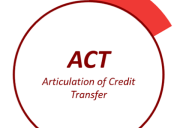You have /5 articles left.
Sign up for a free account or log in.
Guarantee a clear and affordable path for community college graduates looking to earn their bachelor’s degree. This was the vision guiding the staff of the New England Board of Higher Education (NEBHE) as we created the New England Transfer Guarantee, our signature community college transfer initiative. A clear priority has always been quantitative assessment of the transfer program’s performance. With the second full year of enrollment data analyzed, our team is encouraged to see and share strong evidence that the road between eligible community colleges and participating four-year institutions is becoming a well-traveled one for transfer students in the region.
Guaranteed admission is contingent on a completed associate degree from an instate community college and a cumulative grade point average (GPA) that meets the minimum set by the four-year receiving institution. Efficient and reliable transfer pathways are key to achieving the equitable and affordable higher education system of the future.
Following the June Supreme Court decision banning the use of affirmative action in college admissions and, given the realization that the United States will fall short of the federal college completion goals, there has been a renewed emphasis on community college transfer at both the federal and state levels. In this context, the Guarantee has experienced increased attention for its potential to positively impact diverse undergraduate enrollment and strong completion records for receiving institutions.
In Massachusetts, for example, the Guarantee was cited in guidance issued by Governor Maura Healey and Attorney General Andrea Campbell on how higher education institutions can continue to meet diversity and equity goals in response to the ban on affirmative action. The partnerships forged between two- and four-year institutions in this initiative have been cited in a feasibility study on free community college in the Commonwealth of Massachusetts. As the NEBHE embarks on a new chapter in its work to increase access to quality higher education in prison (in the wake of the July 2023 reinstatement of Pell Grants for all eligible incarcerated learners), a focus on credit mobility has again raised the relevance of the networks built through the Guarantee.
The New England Transfer Guarantee got its start with funding from the Teagle Foundation and the Davis Educational Foundation and has secured additional support from both the Arthur Vining Davis Foundations and the Balfour Foundation to expand the community college transfer initiative to all six New England states. As of Spring 2023, the Guarantee has been in operation for two full academic years in Connecticut, Massachusetts and Rhode Island. After we published the inaugural Guarantee enrollment report in November 2022, we began working closely with receiving institutions to adjust the data collection process to make it sustainable over time, and we were thrilled to see more consistent data submissions across the 27 participating institutions enrolling students through the Guarantee.
The NETG Second Annual Enrollment Report analyzed data from nearly 800 participating students, and we are excited to share some key findings:
- Overall Guarantee enrollment remains consistent across time. NEBHE saw that Guarantee enrollment is stable across the two academic years covered in the report—with even a slight (two percent) increase from the program’s first year to its second. To date, a total of 786 students have transferred to receiving institutions since the program launched in Spring 2021, which represents a 67 percent increase in total Guarantee enrollment from the 470 students analyzed in the inaugural enrollment report.
- Students participating in the Guarantee are maintaining impressive academic records pre- and post-transfer. The average cumulative community college GPA for Guarantee students between Spring 2021 and Spring 2023 was a 3.30, which is well above the highest GPA threshold (a 3.0) that participating institutions can select as the bar for guaranteed admission through this initiative. This academic achievement continued at the receiving institutions, where Guarantee students finished their first semester of coursework with an average GPA of 3.55.
- Guarantee students bring diverse perspectives and identities to their transfer destinations. In the data submitted to NEBHE, covering the Spring 2021 to Spring 2023 terms, the median age among Guarantee students was 26 years old at the time of their enrollment at the four-year transfer destination. During this same period, 43 percent of Guarantee students reported on identified as Black, Indigenous or People of Color (BIPOC).
- Early data on baccalaureate completion among Guarantee students are promising. The central goal of the Guarantee remains to support students on their path to achieving a baccalaureate degree. For the 89 students who completed a bachelor’s degree program through the beginning of Spring 2023, the average time-to-degree was four semesters, the average GPA at graduation was a 3.66, and the average credits at the time of graduation was 122.
The above data are only a small taste of the insights contained in our recently published report. The New England Transfer Guarantee Second Annual Enrollment Report offers a program-level overview and state-by-state observations. With the increase in available data since the inaugural report, NEBHE is able to discuss new data points with more confidence, including what majors are most popular for community college graduates transferring through this program and what percentage of Guarantee students are identified as first-generation college students by their receiving institutions.
As the program expands, we will gain a further understanding of how participating institutions perform relative to state and national averages, including the outcomes shared in the February 2024 report Tracking Transfer: Four-Year Institutional Effectiveness in Broadening Bachelor’s Degree Attainment. With just two years of data analyzed, we can see that the transfer paths that comprise the Guarantee are outperforming the one-year retention rates in the 2024 report. For Guarantee students, all of whom were transferring to private nonprofits, the one-year retention rate was 94 percent, compared to the 86 percent one-year retention rate reported for transfer-in at private nonprofit institutions in California, the highest of any state in the report. The report does not provide state-specific data on award recipients but does provide a national retention rate for private nonprofits for students who transfer with an award in hand (81 percent). This is even further below the 94 percent observed in our first two full years of the program.
NEBHE is working to empower participating Guarantee institutions to understand how their students are performing compared to state- and program-wide averages. Starting in March 2024, NEBHE will provide institutions with analysis allowing them to view key findings from their school’s data alongside the state- and program-wide findings from the Second Annual Enrollment Report. We believe these individualized resources created for a single institution can catalyze additional program improvements. Just like the quarterly meetings that NEBHE rolled out for Guarantee Coordinators in the three southern New England states in September 2023, these institutional reports serve as a starting place for robust discussion about how we can all contribute to widening the transfer road and smoothing the path for community college students looking to take the next step in their higher education journey.


